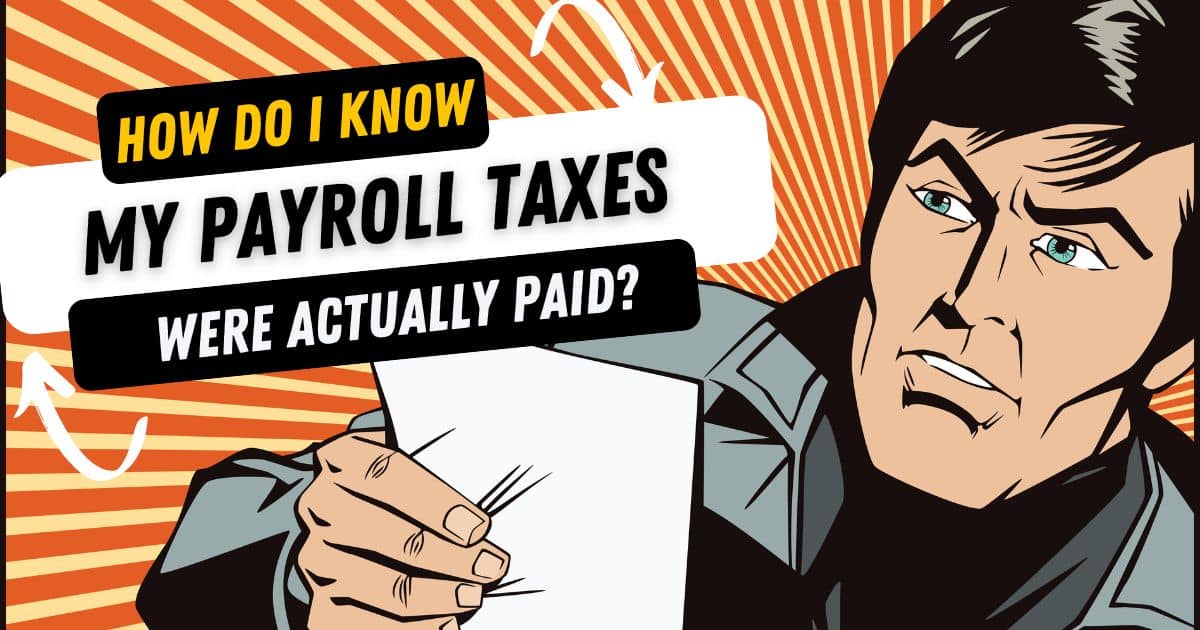
“Did you lock the door?” I ask my wife as we pass by each other in the hall. Me, on my way to grab a glass of water before heading to bed, her en route to brush her teeth.
“Mmhm” she says as she finishes a contagious yawn. I trust my wife more than any other human on this planet, but that doesn’t stop me from double-checking that the door is locked as I pass it on my way to the kitchen, and triple checking on my way back. It helps me sleep at night. There is no substitute for seeing something with your own two eyes, feeling the sturdy assurance as you pull on a door that doesn’t budge. This is what I think about when someone says, “peace of mind.”
Payroll taxes are like this. You want security
If you outsource your payroll, your payroll taxes are most likely being paid in by your payroll company. But knowing that it should be happening is not always the same as knowing that it is happening. So how do you get your peace of mind that this is all being done correctly? Let’s talk about why you should care about making sure your payroll taxes get taken care of, how you can check, and what you should do if you get a notice that says you have an amount due.
Why you should care about payroll taxes
Paying your taxes is like ripping off a band-aid—the longer it takes you, the more painful it will be. There are late payment penalties, accumulating interest on amounts due, and, if things get really bad, tax levies that will take money straight from your bank account. If you are a business owner, making sure that your tax payments are getting to the right place at the right time will save you headaches down the road. Double-checking is not a sign of distrust; it is an assurance. Unfortunately, paying someone to do something does not always mean it is going to get done the right way.
How to check and see if you've paid payroll taxes
At the end of each quarter, your company is required to file a payroll tax return with the IRS called a Form 941. This return reports all the wages you have paid your employees and all the payroll taxes that you have to pay to the IRS. If you are interested in learning more about tax calculations and making sure you are paying the correct amount, check out this blog. A large misconception is that the 941 return and the payroll tax payments are due at the same time. That is only partially true. The 941 serves as a check-in for you to record the wages you paid and for the IRS to make sure it matches the taxes you’ve paid. Your payroll taxes, on the other hand, will be due Monthly or Semi-weekly. This is determined by looking back to see if you paid $50,000 in taxes over the last four quarters. Under $50k makes you monthly and over $50k makes you semi-weekly. Since penalties and interest will be based on this schedule, waiting to pay your taxes at the same time you file your quarterly 941 return could get you into serious trouble.
If you want to double-check that all your payroll taxes are being paid appropriately, there is a way you can do this easily. Every cent you pay in taxes should be recorded by the tax agency, whether federal, state, or local, and somebody is keeping track of your payments. These agencies have made the push to file and pay taxes in a way that allows you to see the records online. With the IRS, you can register for their EFTPS program, which allows you to log in and see that your tax liabilities have been made, which is a great way to get assurance that the parties responsible are holding up their end of the bargain as it relates to making tax payments. Most states have similar technology where you can register for an account that gives you visibility into your tax payment history.
What happens when you get an "Amount Due" notice
You’ve hired a payroll company to take care of all of this for you. You trusted them, and now THIS. This is proof that they haven’t been doing their jobs. Well, not exactly. When you receive a letter from the IRS or your state's department of revenue saying that you haven’t paid your taxes and that you have an amount due, do not hit the panic button just yet. The saying “good enough for government work” wasn’t coined in a vacuum. Send the notice to your payroll provider, and more than likely, they have been paying your taxes, and something was recorded incorrectly. Your payroll provider should be able to use the information in the notice to pinpoint the issue and work directly with the taxing agency to get it corrected.
Stop worrying about this. Find someone who keeps you compliant
If you find yourself worrying about payroll taxes or any of the other compliance issues you can run into as a business, we would love to help. Click that “Let’s Chat” button at the top of the page so we can get one step closer to removing the tax burden from your to-do list.
Topics: